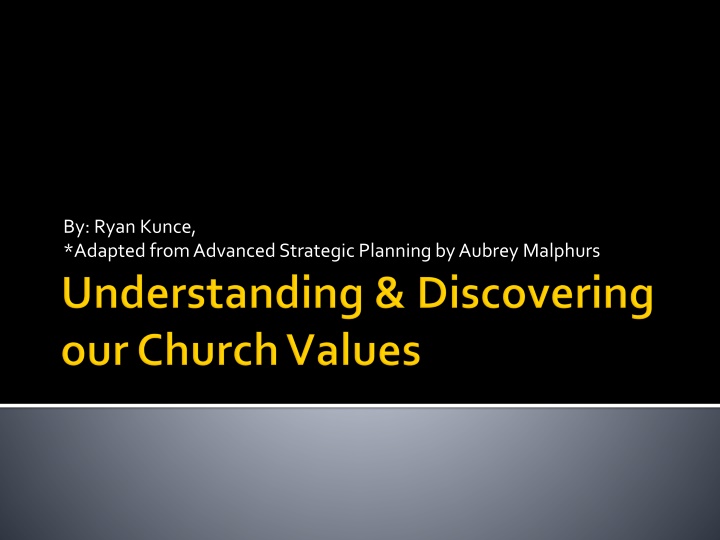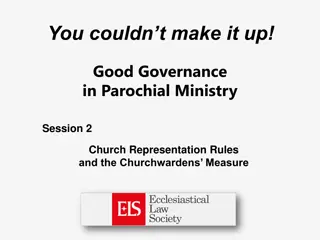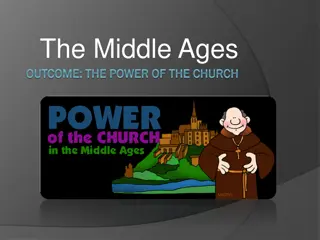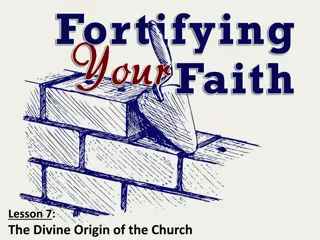Unveiling the Significance of Core Values in Church Leadership
Delve into the essence of core values in church leadership to comprehend their pivotal role in establishing identity, guiding actions, and shaping organizational culture. Explore the scriptures, strategic planning insights, and the intrinsic link between values and mission, all essential components in fostering congregational growth and purposeful ministry.
Download Presentation

Please find below an Image/Link to download the presentation.
The content on the website is provided AS IS for your information and personal use only. It may not be sold, licensed, or shared on other websites without obtaining consent from the author.If you encounter any issues during the download, it is possible that the publisher has removed the file from their server.
You are allowed to download the files provided on this website for personal or commercial use, subject to the condition that they are used lawfully. All files are the property of their respective owners.
The content on the website is provided AS IS for your information and personal use only. It may not be sold, licensed, or shared on other websites without obtaining consent from the author.
E N D
Presentation Transcript
By: Ryan Kunce, *Adapted from Advanced Strategic Planning by Aubrey Malphurs
Discovering Core Values! Why We Do What We Do (INTRO) We will explore why values are so important. We will look at the definition of values and how they help us discover, develop and communicate with our congregation. After our beliefs in the Lord and scriptural Truth, core values are the corporate heart and soul of our church. Note: there is a difference in beliefs and values. We will get to this in a little bit. Core Values explain who we are our identity. why we do what we do. Form the foundation on which the mission and vision are built. Along with them form the church s core ideology. (navigation terms, it s like the GPS)
Acts 2:42-47 (ESV) 42 And they devoted themselves to the apostles teaching and fellowship, to the breaking of bread and the prayers. 43 And awe came upon every soul, and many wonders and signs were being done through the apostles. 44 And all who believed were together and had all things in common. 45 And they were selling their possessions and belongings and distributing the proceeds to all, as any had need. 46 And day by day, attending the temple together and breaking bread in their homes, they received their food with glad and generous hearts, 47 praising God and having favor with all the people. And the Lord added to their number day by day those who were being saved.
Worship vs 47 Fellowship vs 42 & 46 Biblical Instruction / Discipleship vs 42 Evangelism vs 47 Ministry vs 46 Prayer? Vs 42 Healing of the sick by miracles? Vs 43
Perhaps more than at any previous time, an organization today must know what it stands for and on what principles it will operate. No longer is values-based organizational behavior an interesting philosophical choice -it is a requisite for survival Ken Blanchard & Michael O Connor *Malphurs, Aubrey. Advanced Strategic Planning: A New Model for Church and Ministry Leaders. Grand Rapids, MI: Baker, 1999. 98. Print
The most important single element of any corporate, congregational or denominational culture, is the value system. Lyle Schaller *Malphurs, Aubrey. Advanced Strategic Planning: A New Model for Church and Ministry Leaders. Grand Rapids, MI: Baker, 1999. 98. Print
1. Values Determine Ministry Distinctives You can learn a lot about a church before walking through the doors for the first time based on reading the church s core value statement. Value statements/Credos tell you about the church and its distinctions. Ex. If you see family on the value statements, this value catches peoples attn. It tells you family is important. Therefore you know there will be a ministry based around families at this church.
2. Values Dictate Personal Involvement People look for a church that has their same values. Joining a Church is like a marriage. Sharing same values pull together. Different values pull apart. Pastors also must doctrinally align with the church. He needs to know his core organizational values and those of the church before seeking a position and vice versa. When the pastor marries a church with different core beliefs, either one or both sue for divorce. Church planting is an exception to this rule.
3. Values Communicate What is Important Communicate what really matters. Says this is what matters, it s who we are; this is what we can and cannot do for you. Jerusalem church communicated what was important through its values in Acts 2:42-47 Commitment to one s core values helps pastors know where to draw the line in the sand.
4. Values Embrace Good Change As the culture and country shifts from one worldview to another-modernism to postmodernism-there is even more change happening in a shorter amount of time. Church is not exempt from its effects. The problem for the church is how to know if the change made are good or bad for the church. We must ask, Does this change agree with or contradict our core values/beliefs as a ministry?
5. Values Influence Overall behavior Values shape the ministry. This is known as values Impact It dictates every decision and influence we have in the church. It begets attitudes that dictate behavior. For example notice Acts 6:1-7.
Acts 6:1-7 (ESV) 1 Now in these days when the disciples were increasing in number, a complaint by the Hellenists arose against the Hebrews because their widows were being neglected in the daily distribution. 2 And the twelve summoned the full number of the disciples and said, It is not right that we should give up preaching the word of God to serve tables. 3 Therefore, brothers, pick out from among you seven men of good repute, full of the Spirit and of wisdom, whom we will appoint to this duty. 4 But we will devote ourselves to prayer and to the ministry of the word.
5 And what they said pleased the whole gathering, and they chose Stephen, a man full of faith and of the Holy Spirit, and Philip, and Prochorus, and Nicanor, and Timon, and Parmenas, and Nicolaus, a proselyte of Antioch. 6 These they set before the apostles, and they prayed and laid their hands on them. 7 And the word of God continued to increase, and the number of the disciples multipliedgreatly in Jerusalem, and a great many of the priests became obedient to the faith.
5. Values influence behavior cont. The 12 faced potential church split over an accusation of discrimination. Grecian Jews accused Hebraic Jews of neglecting their widows in daily dispersementof food. Instead of taking time to wait on these widows, the 12 assigned this responsibility to 7 highly qualified people and gave their attention to the higher-value ministries of prayer and of the Word. They chose prayer and teaching over that of what we might call pastoral care and visitation today.
6. Values Inspire People to Action Congregational beliefs are the invisible motivators that move its people toward meaningful ministry. Values of leaders and followers catalyze & energize people. But if both don t align in values they may not. Ex. You can tell a congregation to evangelize to the lost and support missions. However, if they are not part of their values mix, they re not likely to happen. To catalyze the greatest amount of energy is to touch people at the level that gives meaning to their lives-at the values level.
7. Values Enhance Credible Leadership Values drive leaders as well as churches. Leaders MUST know and articulate what they stand for. This needs to be the leader s bottom line and is imperative that these be biblical. Leaders must model a lifestyle consistent with those values. Leadership that aligns with solid beliefs invites credibility. Leadership that contradicts its values quickly loses all credibility and forfeits the ministry.
8. Values Contribute to Ministry Success To succeed we must examine our beliefs with Its premises, all its policies, and contradictions. Then discover which of our beliefs are values in the church. Ingrained understanding of our shared core values is more important than skills and technical skills. Shared values encourage people to serve longer hours and work harder. Inspired community of believers who are united in a common cause is enthusiastic and exerts a strong influence on its ministry constituents (Acts 2:42-47) Success of a church is the Great Commission in Matt. 28:19-20.
9. Values Determine Ministry Mission and Vision Church s mission is: what it is supposed to be doing. A mission is a statement of the church s direction. It tells where we re going. Church s vision is: what it looks like in the future. A vision is a snap shot that shows where we re going. Just because a church decides that the great commission will be its mission does not mean that this will be the case. If they do not value evangelism it will have some other mission that aligns more closely with its true values. Churches that are not evangelical or that do not value the Bible may have some other mission and vision based on what they do value.
5 Minute Break When we return, defining Values more clearly
Core Values are: constant, passionate, biblical core beliefs that drive ministry. Values dictate congregational behavior (action). These are what we already do, not what we should do. A shift in values takes between 3-8 years. They do not easily or quickly change. If values change too quickly the congregation will be left in a state of confusion.
2 Thoughts here: 1. Values are Constant It is the Thread that holds together the every-changing organization. They rarely change because they compromise the DNA of the church. These give purpose to everything the church does.
2. Values are Passionate Passion means to care deeply or to feel strongly. It describes what you care deeply about. Good core values touch the heart and soul of the church and elicit powerful emotions. The values come with strong positive feelings attached stirring through excitement and motivation to action. If your soul isn t stirred then they aren t your value. i.e hunting or fishing, knitting or canning. Visit appendix D - those that you highlight, invoke an emotional response. If the value jumped off the page, it s because it means you feel strongly about it. Shared core values draws kindred spirits.
Actual values generate action. Aspirational Values / Beliefs however do not have action. These are what should or ought to be done but do not happen. Ie. Beliefs that we hold but do not muster passion and action. For example we may believe in evangelism but if we do not do it, we don t value it. Our goal is to discover our Actual Core Values and then consider some Aspirational Values we should have but don t.
Type of Church Unifying Church Role of Pastor Role of People Primary Purpose Typical Tool Desired Result Classroom Church Doctrine Teacher Students To Know Sermon Outline Educated Christians Soul- Winning Church Experiential Church Evangelism Evangelist Bringers To Save Altar Call Born Again Persons Committed Christians Worship Worship Leader Worshipers To Exalt Liturgy Family- Reunion Church Fellowship Chaplain Siblings To Belong Potluck Secure Christians
The Church -Values alert the Pastor to what his expectations will be by the congregation. A pastor, and especially a pastoral candidate, needs to know the values of the church before they serve her. If the pastor fails at these expectations he will be looking for another church. It is critical pastoral search committee s understand their own church s culture and values before beginning the interview process. The Pastor - Pastors have values as well. Their values lead them to also have expectations from the church. Conflict will occur when the values of the pastor clash with the values of the church. This is why it is so critical pastors understand their ministry context before they marry to a church. The values must be in agreement in order for successful ministry to occur.
Example -the pastors overriding value might be Scripture or Biblical Teaching. The congregations primary value might be pastoral care, not Bible teaching. The pastor may not last long in such a culture. Brooke Hills search committee, David Platt s former church, targeted a mission minded pastor. Missions is the core value of the church. Rather than take a chance at a seminary graduate whose values that may not align, they called a pastor from within who already agreed. A very wise and culturally safe move. It is possible for values to change but because they are so deeply and passionately entrenched, it could take years for a pastor or a church s values to change.
Like a ship, if the church is off course then its because the values are not in alignment with its stated mission and vision. Values got us in the boat. Mission says set sail and acquire (gold, oil, tea, freight), vision says where exactly to go (like port of Africa to fulfill the mission). God gave us our heart (values), tells us to go (mission), and we fulfill by VBS, block party, door to door evangelism, Sunday School, ect. (vision)
Values are Functions, Not Forms Values are functions (timeless), not forms (timely). ex. Community/fellowship is a timeless function & value of the church. Whereas a small-group gathering is a timely form. Small groups (form/vision) accomplish the value of community (function/value) but are not timeless and could die as a form. The church would find then another form other than small group to fulfill the value of fellowship its God given context
1. Conscious vs Unconscious Values: example, belief about the pastors role. Say think chaplain, if he does not visit then their will be hurt feelings or anger at him. Timothy and Titus teach his characteristics and responsibilities. Deacons are given the more pastoral care and ministry role while leadership commits to prayer and teaching. 2. Shared vs Unshared Values: Shared bring unity, unshared bring ministry demise
3. Personal vs Organizational Values People hold their own values. Their beliefs at what a church should be. They use these to find a church that organizationally is similar to their own. Churches that are struggling are filled with people who do not share the same values. Even church staff if they disagree on values will experience great discomfort with each other. *This is what we are seeking to discover today, not just Personal but the Organizational values of our church.
4. Actual vs. Aspirational values. Beliefs people do (actual) vs beliefs people hold to but take no action (aspirational). a church may list evangelism as one of its values because it knows it is supposed to be evangelistic. This does not make it an actual value. 5. Corporate vs Departmental Values Sub-ministries like children, youth, senior adults Sunday School classes will have different values than the other one.
Who Discovers the Values? The Strategic Leadership team is tasked with discovering the organizations values. Once discovered, we will accept the responsibility of presenting the results to the congregation for feedback. In order to best articulating them to the rest of our congregation, we must write a values statement or credo. That means we must determine who will develop this credo from our group while remembering that the senior pastor should be a vital part of the process. A minimum team of 4 is my suggestion. Two from the Strategic Planning Team, and both the senior and associate pastor serving as final drafters and editors.
Decide and test the core values statement format before the church. These must be simple, clear, and powerful. See samples on Appendix D. We could have a perfect core value statement but if the ministry constituency does not see it or we fail to communicate it, then it will die an untimely death. Everyone in the church must see these values and it is the responsibility of the strategic leadership team and staff to communicate these.
Make certain these are values not forms Determine the number of values no more than 10. 6 active values 2 aspirational values, marked with footnote or asterisk to indicate so. Remember less is more























